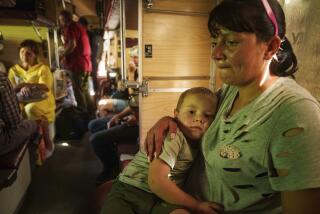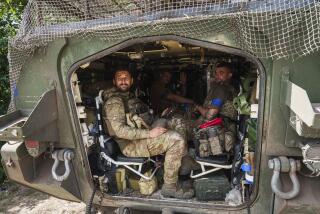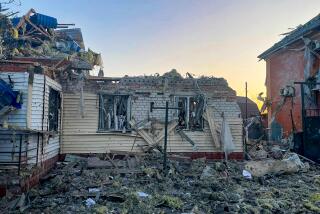Ukrainian troops intensify drive to retake areas taken by militants
Ukrainian government forces fought fierce battles against pro-Russia militants around the occupied town of Slovyansk on Monday in an attempt to recover control of the focal point of a rebellion that Kiev authorities contend is being directed from Moscow.
At least four officers were killed and 30 wounded in the latest move against the armed militants in eastern Ukraine claiming to represent a âPeopleâs Republic of Donetsk,â the Defense Ministry said in a statement reported by the Kyiv Post. A government helicopter was shot down, the ministry reported, but its crew managed to escape.
Interior Minister Arsen Avakov also reported via the newspaper and his Facebook page that a special forces unit was dispatched Monday to Odessa to restore order in the Black Sea port. The city on Friday saw the worst violence in the now 6-month-old conflict between supporters of closer relations with the European Union and the Russia-allied populations in Ukraineâs south and east.
At least 46 people died in Odessa after a clash Friday when firebombs set ablaze the cityâs trade unions building where pro-Russia gunmen had taken up positions on the upper floors. A statement issued by Odessa police after the conflagration suggested the gunmen were targeting a march by supporters of the pro-Western government in Kiev.
Riots were reported over the weekend in Odessa as Russia supporters in the culturally and linguistically divided city stormed police headquarters and freed dozens of pro-Russia militants arrested Friday in alleged violence. Odessa police reportedly did little to resist the jailbreak, prompting the relocation of more than 40 remaining pro-Russia militants in custody and the deployment of the special security force, Avakov said.
A funeral Monday for Vyacheslav Markin, an Odessa regional lawmaker who was severely burned in the Friday fire and died Sunday, drew 300 pro-Russia militants. They vowed to avenge the death of the politician, who was known for his opposition to the Kiev leadership, news agencies reported.
Ukraineâs acting president, Oleksandr Turchynov, and interim Prime Minister Arseny Yatsenyuk took power in Kiev in late February after former President Viktor Yanukovich agreed to a power-sharing interim government and early elections but fled to Russia instead.
Russian President Vladimir Putin and his Kremlin allies have denounced the Kiev leadership as âcoup-installedâ and illegitimate. Days after Yanukovich fled, Russian troops occupied the regional parliament and key government installations in Ukraineâs Crimea area, which organized a hasty referendum on secession and appealed for annexation to Russia. Putin issued a decree making Crimea part of Russia two days after the vote, a move denounced by the international community as illegal.
NATO officials estimate there are 40,000 Russian troops along Ukraineâs eastern border, and the Kiev leadership and its Western allies accuse the Kremlin of plotting to take more territory in the Russian-leaning eastern and southern regions of Ukraine.
Pro-Russia militants, some in Russian army camouflage uniforms and carrying weapons of the Kremlinâs armed forces, have occupied about a dozen towns and cities in an arc of land stretching from the Russian border to the strategic Black Sea ports east of Crimea.
Fighting in Slovyansk and elsewhere in the industrialized Donetsk region has intensified as opponents of the interim leadership in Kiev, the capital, appear to be trying to disrupt a May 25 presidential election. Separatist militants in Slovyansk and the coal and steel belts of the Donetsk region have called a rival vote for secession on Sunday.
Putin justified the Crimea invasion as necessary to defend the peninsulaâs Russian majority population, and Kremlin officials have made similar accusations of endangered Russians and Russian-speakers in denouncing Kiev authority in the tumultuous east and south.
On Monday, the Kremlin news service reported that Putin had been provided a 70-page âWhite Bookâ detailing human rights abuses in Ukraine since the rebellion against Yanukovich began in November.
âThe report is aimed at drawing the attention of the world community and international legislators to registered human rights violations in Ukraine,â Putin spokesman Dmitry Peskov said according to an RIA Novosti report.
The reported violations were based on âinformation from Russian, Ukrainian and Western media sources, statements by representatives of the current authorities in Kiev and their supporters, eyewitness accounts and on-the-spot observations and interviews of Russian noncommercial organizations,â the Kremlin news service said.
Ukraineâs interim authorities and U.S. and European officials have expressed concern that the Kremlin is laying the groundwork to justify an invasion of eastern and southern Ukraine on the pretext of defending the Russian communities Putin and his government contend are being abused by âfascistâ leaders in Kiev.
More to Read
Sign up for Essential California
The most important California stories and recommendations in your inbox every morning.
You may occasionally receive promotional content from the Los Angeles Times.











